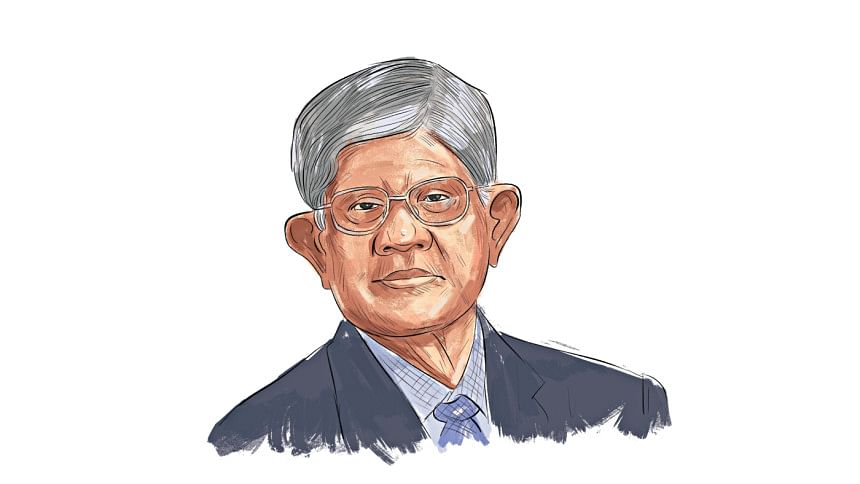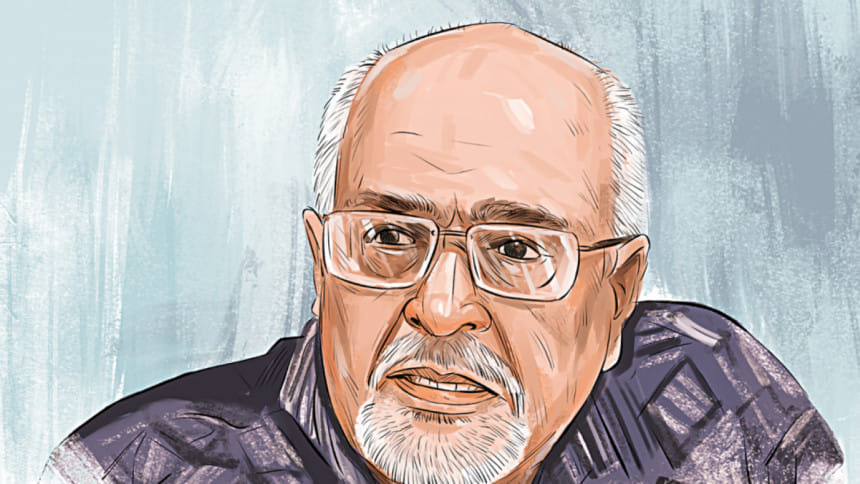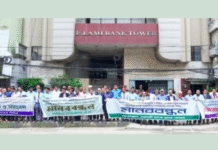
Finance Adviser Salehuddin Ahmed said yesterday that inflation is not slowing despite tariffs being reduced on many goods due to the prevalence of extortion across the supply chain.
“The big difference between production prices of goods and consumer prices is a major concern. This is because of extortion in many spheres,” the adviser said at an annual conference organised by the International Business Forum of Bangladesh (IBFB) at Gulshan Club.
“Middlemen are a part of the business cycle. However, transferring ownership of goods three to four times while the product remains in the same truck is not the work of middlemen. This is extortion,” Ahmed said.
It is difficult to reach a political compromise, but it is easy for extortionists to form a nexus, he said.
The central bank increased the policy rate in order to reduce inflation and that has been working on the demand side, but the main problem is on the supply side, which is difficult to resolve, he added.

At the same event, Debapriya Bhattacharya, a distinguished fellow at the Centre for Policy Dialogue, cautioned: “Even people who would love to see reforms may lose patience if the interim government cannot ensure economic relief and maintain a stable law-and-order situation.”
He stressed the importance of a consolidated, effective and confidence-boosting medium-term plan.
Speaking as the chief guest, Finance Adviser Ahmed also said that the interim government is committed to separating the tax policy division from tax administration.
“We have decided in principle to separate the tax policy part from tax collection. This means people who make tax policies will not be responsible for collecting taxes. But it may take some time,” he added.
Ahmed further said that the interim government has inherited an economy that was corrupt to an unthinkable extent.
In the last 15 years, regulatory failures, including at the most well-known public institutions such as the Bangladesh Bank and National Board of Revenue, posed a major concern.
However, Ahmed said rules and norms were violated not only by regulatory bodies, but also by business communities and financial institutions. So, the blame should not be squarely on policymakers.
He added that Bangladesh may be a unique country, where some businesspeople own everything.
“They own the media, they own industries, and they also occupy seats in parliament,” he said, adding: “How can they take good steps against people who are the same as them?”
The finance adviser also reminded that the interim government inherited a crippled banking sector, which has now improved.
On the other hand, Ahmed noted that corruption had been rampant in the capital market, but it was not able to correct itself naturally due to the imposition of artificial mechanisms such as floor prices.
“When the new commission began diagnosing the market and punishing culprits, stock indices started to fall. Now, the market is being corrected but people are crying,” he said.
“Some people are blaming the commission now. But it is penalising offenders on the basis of past investigations, fines for which should have been imposed at least two years ago.”
It may be painful, but it will ultimately be good for investors, he said, adding that the interim government is already trying to reduce the capital gains tax to provide a salve.
He also said tax exemptions would be curbed, saying: “We will be unable to give tax exemptions, but we will try to adjust taxes if they are high.”
An industry cannot get benefits year after year, he said while adding that it is impossible to provide undue concessions or incentives.
In his address, Bhattacharya said fixing the data ecosystem was a looming challenge.
He said the white paper on the state of the economy had demonstrated that export figures and GDP data were inflated.
“Not only that, but investment data, employment data and export data, all these things were quite screwed up. So how we can fix the data ecosystem is a major issue.”
He also said that one of the fundamental failures of the development narrative of the past 10-15 years was that growth was achieved despite private investment stagnating.
“Private investment stood around 31-32 percent of the GDP, and that remained stagnant. At the same time, we were achieving a 7 percent growth rate. Have you ever seen that kind of growth happening without investment?
“The problem is not only the investment issue. The problem is that the competitiveness of the economy as a whole was not really improving,” he added.
Bhattacharya traced corruption as the main villain, saying it persisted in different forms.
Reed J Aeschliman, mission director of USAID, said trade, not aid is necessary for Bangladesh to grow from lower-middle income status to higher-middle income.
Humayun Rashid, president of the IBFB, and Mahmudul Islam Chowdhury, founding president of the IBFB, also spoke at the event.
tbs









